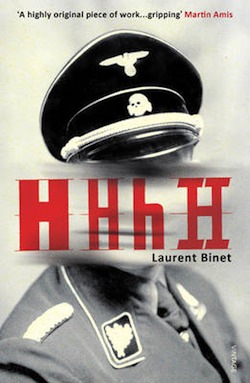The first and most important thing to mention about HHhH is that despite it’s location in the fiction department of your local book retailer, website or library it is, for the most part, a work of astounding, obsessive non-fiction. The attention to detail and historical accuracy in the tale of second world war heroism and tragedy leaves as strong an impression on the reader as the personal tragedies in the books main narrative tale of espionage, plotting and duplicity.
HHhH tells two stories. The non-fictional story of two Paratroopers, who left their homeland of Czechoslovakia under Nazi occupation after their army meekly surrendered following the collapse of their neighbours, only to return as British agents with the brief to assassinate Reinhardt Heydrich, “the hangman of Prague” as a show of defiance for the Czech government in exile. The author, Laurent Binet has such intense interest in telling this forgotten story, that his relentless research leads to elements of fiction creeping in to his book in an unusual counterpoint to the story of the two protagonists and their fellow agents. This is where the second, fictional element of the book enters the fold. The painstaking attention to the detail of the assassination attempt is accompanied by interjections from the author explaining his process of researching crucial events in the story. At first these expositions feel a little intrusive, especially when you are used to the usual narrative stream of a historical account, but as the reader becomes used to the addition of the footnotes, they bizarrely ramp up the tension of an already extraordinarily claustrophobic atmosphere.
The two protagonists hold the fate of a city, perhaps even a country in their hands as they are pursued through Prague by every Nazi and collaborator in the city. Then, at the same time, Binet scribbles feverishly, almost hallucinatory in his own climax of research. The passion with which Binet writes about not only his source material, but also the writing process is infectious to the point that the reader hangs on his words as he agonises over which detail he will decide to include in his narrative having decided upon its truthfulness. He is as often full of admiration for fellow historians as he is disparaging of accounts which use dramatic license. This literary device comes into its own when creating set pieces around the assassination attempt. The accuracy of the document lends these scenes a real immediacy, and while the details constantly intrude, they do so intentionally, and welcomely.
The city of Prague becomes a character in itself, its labyrinthine streets looming over every person in it, dominating everyone except the malignant villain Heydrich, every bit as disgusting and monomaniacal as any bond villain, except that he is truly sickening in his existence in the annuls of history as the man who had the solution to Hitler’s Jewish problem. Binet (a history teacher) conjours an authentic feeling of horror at the torments inflicted upon the population and the architecture of Prague, this is not a love letter to Prague, more a poison pen letter.
The intermingling of precise historical accuracy with a personal account of research and authoring works to document a series of events which deserve to be celebrated and remembered by our generation and provide a genuine insight into the writing process behind a historical novel. It is unique and affecting and because of Laurent Binet’s unusual literary device, you will judge every other non-fiction book by it’s standards. They may seem lesser in comparison.
Laurent Binet HHhH review: 4.1/5



